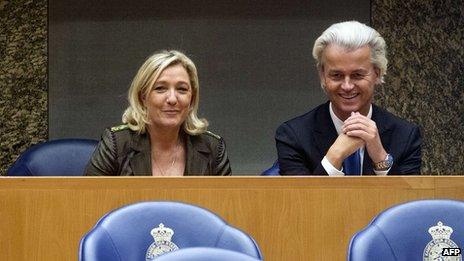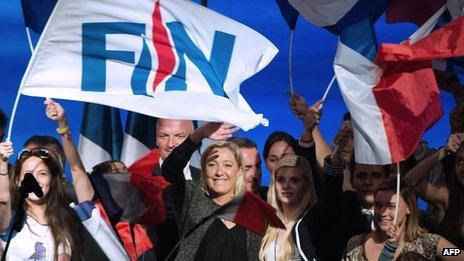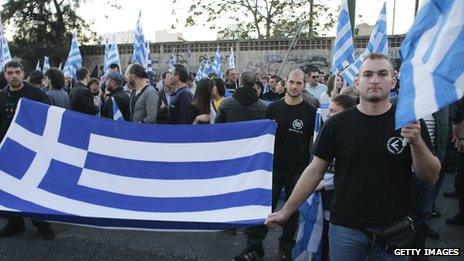Anti-EU parties plan strategy to woo Europe's voters
- Published

Will a Le Pen-Wilders alliance rally Eurosceptics in the election?
At the European Parliament's hi-tech visitors' centre you can learn about the history of the European Union in all 24 of the EU's official languages.
A 360-degree digital surround screen takes you into the heart of a virtual parliamentary chamber.
But for those in this parliament who believe passionately in the European Union idea - and there are obviously many - these are testing times.
Among voters there is a sceptical mood, based in part on feelings of economic insecurity, and on concerns about immigration. Populist anti-EU parties are mobilising, to try to take advantage.
Opinion polls suggest that both Marine Le Pen's National Front (FN) in France and Geert Wilders's Party for Freedom (PVV) in the Netherlands stand a chance of coming first in next May's European elections.
And now they want to form a pan-European, radical right-wing alliance, to shake up the system, meeting in The Hague to plot a joint strategy.
"We don't feel very comfortable being a kind of province in the European super-state," Mr Wilders told me in an interview earlier this year.
"More than half of the laws in Holland are not initiated by the Dutch cabinet, but by the European Council, or Commission or parliament - by the European elite."
A new bloc?
Mr Wilders has tacked hostility to Europe onto his anti-Islam agenda to try to broaden his party's appeal.
But it is far from clear how many parties in other countries are interested in joining an informal alliance led by Mr Wilders and Ms Le Pen.
Much will depend of course on the actual results of the European elections in six months' time.
To form a parliamentary group, which would receive official funding, they would need at least 25 MEPs from seven different countries.
There is already a strongly Eurosceptic group in parliament, Europe of Freedom and Democracy (EFD), which is dominated by the UK Independence Party (UKIP) and the Northern League from Italy.
But neither the FN nor the PVV are part of that bloc and if they were to set up a group of their own that could create a problem for the UKIP leader Nigel Farage.
He has already made it clear that he will play no part in the Wilders/Le Pen initiative - he has no intention of being tarred by an extremist brush. But he will not want to lose allies to an alternative group.
"Another grouping would leave the EFD as the moderate Eurosceptic group in the European Parliament," counters a UKIP spokesman. "And that would be good for UKIP."
And if the far right and other anti-EU parties do make a big breakthrough in the elections, others will ensure that they are held to account.
"We should tackle (them) head on, challenge them and challenge their views which I find very unsavoury," argues the Dutch Liberal MEP Sophie in 't Veld.
"I'd rather do that than keep them out of the political arena through election procedures. It will force them to take responsibility for their promises."

Opinion polls suggest the FN could win the European election in France
Broad spectrum
It is difficult to predict exactly how the cards will fall because unhappiness with the way the EU operates comes in many forms - British Euroscepticism is just one of them.
There are parties on the radical left like Syriza in Greece, insurgent political groups like Beppe Grillo's Five Star movement in Italy, and overt racists such as Jobbik in Hungary or Greece's neo-Nazi Golden Dawn.
All of them are seeking to take advantage of the fact that many voters are disaffected, and anxious about the future.
"I feel it everywhere," Sophie in 't Veld says, "but the problems are much deeper than simply resentment against Brussels".
Talk to anti-capitalist demonstrators in Dam Square in Amsterdam, and you get a sense of people concerned that there are global forces and elites that are beyond the control of ordinary voters.
They dismiss the European Union, and accuse it of lies and corruption. But a suggestion that they might have common cause with Geert Wilders brings a rapid response.
"Oh no, I don't support Wilders, not at all," says one man with an almost embarrassed chuckle.
"I don't support any political party," adds the woman standing next to him, lifting up her Guy Fawkes mask to make her point with extra emphasis.
That lack of enthusiasm for any party is certainly reflected in the turnout for European elections.
While the powers of the European Parliament are on the rise, voter participation has gone down in every election since the parliament was first directly elected by citizens in 1979.
This too provides opportunities for extremist parties with simple messages to flourish.

Leaders of nationalist Golden Dawn have been indicted in Greece
'Vacuum of vision'
"It is very fertile ground for demagogues," says Michael Geary, who teaches history at the University of Maastricht - a town synonymous with the idea of European Union.
"The mainstream parties need to tackle the rhetoric from the far-right, and the far-left. But more importantly they need to present an alternative vision.
"There is a massive vacuum of ideas, a vacuum of vision."
It all adds up to a real challenge for the parties that traditionally make up the vast majority of members of the European Parliament.
In one recent opinion poll by Gallup more people said the EU was going in the wrong rather than the right direction, in 20 out of 28 member states.
And - crucially - this is not just a protest about austerity.
"It's not just money, you don't live by bread alone," explains Robert Manchin, the managing director of Gallup Europe.
"It's really [about] symbols, [about] sovereignty, and a feeling of control over your life. And if they cannot provide that, then I am looking for sources somewhere else."
In other words, there is a complex, febrile political mood across Europe.
Extremist parties are set to make a real electoral impact in some countries, but not in others.
In Spain and Portugal, for example - two countries that have really suffered in the economic crisis - there is little sign that populism will have a significant electoral impact.
Mainstream centre-left and centre-right groups are still expected to hold dominant positions in the next European Parliament. But up to one-third of its members could well be bitter opponents of the Union it oversees.
- Published13 November 2013
- Published16 October 2013
- Published4 May 2013
- Published26 July 2013